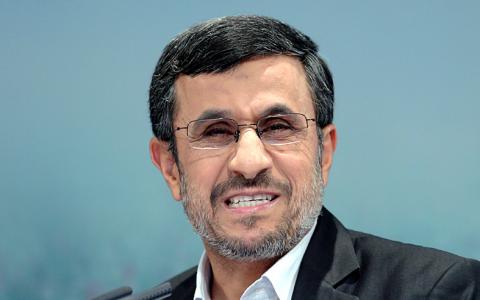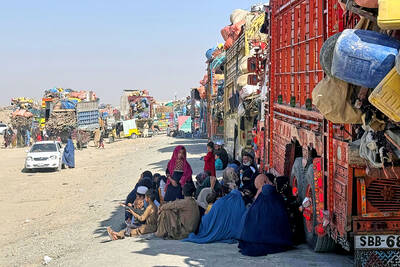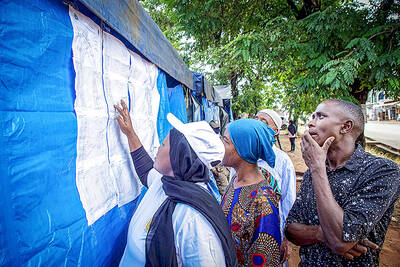Iran would enrich uranium up to 60 percent purity if negotiations with major powers over its nuclear program fail, an Iranian lawmaker said on Tuesday, in comments that may add to Western alarm about Iranian intentions.
Mansour Haqiqatpour, deputy head of the Iranian parliament’s Foreign Policy and National Security Committee, said 60 percent enrichment would be enough to yield fuel for nuclear submarines, which often require uranium refined to high levels.
However, such moves would also take Iran another significant step closer to the 90 percent enrichment level needed to make atomic bombs, which the West suspects is the Islamic state’s ultimate aim. Iran says its nuclear program is for peaceful energy only.

Photo: EPA
Even though it is Iranian Supreme Leader Ayatollah Ali Khamenei — and not the parliament — who decides foreign policy issues, Haqiqatpour’s remarks were a sign of Iranian defiance in the face of Western demands to curb sensitive nuclear activity.
Iran now enriches uranium to a 3.5 percent concentration of the fissile isotope U-235 — suitable for nuclear power plants — as well as 20 percent, which it says it needs for a medical research reactor.
Israel, Iran’s archfoe, says Tehran is seeking a nuclear weapons capability and last week warned the Islamic state will be on the brink of developing a nuclear weapon by the middle of next year, referring to its growing stock of 20 percent material.
However, Western experts believe Iran is still a few years away from being able to assemble a nuclear-armed missile. Haqiqatpour’s comments, carried by Iran’s English-language Press TV, appeared to be an attempt to show the six world powers involved in diplomacy with Tehran that it has no intention of backing down in the long-running nuclear dispute.
The powers — including the US, Russia, China and six European heavyweights — want Iran to halt 20 percent enrichment, shut down the underground facility where this is done and ship out the stockpile.
Iran wants the powers to recognize its “right” to refine uranium and also ease sanctions on it. Three rounds of talks since April have failed to make any breakthrough.
“In case our talks with the [six powers] fail to pay off, Iranian youth will master [the technology for] enrichment up to 60 percent to fuel submarines and ocean-going ships,” Haqiqatpour said.
The powers should know that “if these talks continue into next year, Iran cannot guarantee it would keep its enrichment limited to 20 percent. This enrichment is likely to increase to 40 or 50 percent,” he said.

With much pomp and circumstance, Cairo is today to inaugurate the long-awaited Grand Egyptian Museum (GEM), widely presented as the crowning jewel on authorities’ efforts to overhaul the country’s vital tourism industry. With a panoramic view of the Giza pyramids plateau, the museum houses thousands of artifacts spanning more than 5,000 years of Egyptian antiquity at a whopping cost of more than US$1 billion. More than two decades in the making, the ultra-modern museum anticipates 5 million visitors annually, with never-before-seen relics on display. In the run-up to the grand opening, Egyptian media and official statements have hailed the “historic moment,” describing the

‘CHILD PORNOGRAPHY’: The doll on Shein’s Web site measure about 80cm in height, and it was holding a teddy bear in a photo published by a daily newspaper France’s anti-fraud unit on Saturday said it had reported Asian e-commerce giant Shein (希音) for selling what it described as “sex dolls with a childlike appearance.” The French Directorate General for Competition, Consumer Affairs and Fraud Control (DGCCRF) said in a statement that the “description and categorization” of the items on Shein’s Web site “make it difficult to doubt the child pornography nature of the content.” Shortly after the statement, Shein announced that the dolls in question had been withdrawn from its platform and that it had launched an internal inquiry. On its Web site, Le Parisien daily published a

‘NO WORKABLE SOLUTION’: An official said Pakistan engaged in the spirit of peace, but Kabul continued its ‘unabated support to terrorists opposed to Pakistan’ Pakistan yesterday said that negotiations for a lasting truce with Afghanistan had “failed to bring about a workable solution,” warning that it would take steps to protect its people. Pakistan and Afghanistan have been holding negotiations in Istanbul, Turkey, aimed at securing peace after the South Asian neighbors’ deadliest border clashes in years. The violence, which killed more than 70 people and wounded hundreds, erupted following explosions in Kabul on Oct. 9 that the Taliban authorities blamed on Pakistan. “Regrettably, the Afghan side gave no assurances, kept deviating from the core issue and resorted to blame game, deflection and ruses,” Pakistani Minister of

UNCERTAIN TOLLS: Images on social media showed small protests that escalated, with reports of police shooting live rounds as polling stations were targeted Tanzania yesterday was on lockdown with a communications blackout, a day after elections turned into violent chaos with unconfirmed reports of many dead. Tanzanian President Samia Suluhu Hassan had sought to solidify her position and silence criticism within her party in the virtually uncontested polls, with the main challengers either jailed or disqualified. In the run-up, rights groups condemned a “wave of terror” in the east African nation, which has seen a string of high-profile abductions that ramped up in the final days. A heavy security presence on Wednesday failed to deter hundreds protesting in economic hub Dar es Salaam and elsewhere, some